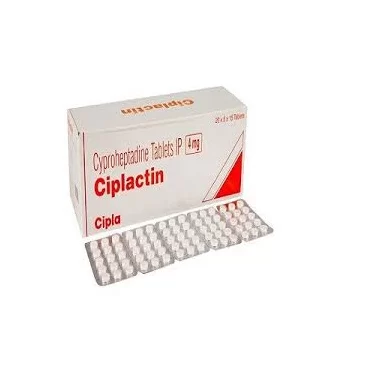The Science Behind Ciplactin 4mg: How It Works in the Body
The Science Behind Ciplactin 4mg: How It Works in the Body
|
Ciplactin 4mg, known scientifically as cyproheptadine hydrochloride, is a medication primarily used to treat various conditions such as allergic reactions, appetite stimulation, and migraine prevention. Today, let's delve into the pharmacological mechanisms through which Ciplactin 4mg exerts its effects and explore its role in clinical practice.
Histamine Antagonism: One of the primary mechanisms of Ciplactin is its antagonism of histamine receptors. Histamine is a chemical mediator involved in allergic reactions, causing symptoms such as itching, sneezing, and nasal congestion. By blocking histamine receptors, Ciplactin helps alleviate these symptoms, making it effective in managing allergic conditions like hay fever, allergic rhinitis, and urticaria (hives). Appetite Stimulation: Another notable effect of Ciplactin is its ability to stimulate appetite. This property has made it a valuable tool in the management of conditions characterized by poor appetite or weight loss, such as malnutrition, anorexia nervosa, and cachexia associated with certain medical conditions. The exact mechanism through which Ciplactin enhances appetite is not fully understood, but it is believed to involve interactions with various neurotransmitter systems in the brain. Serotonin Antagonism: Ciplactin also exhibits antagonistic effects on serotonin receptors. Serotonin is a neurotransmitter involved in regulating mood, appetite, and various other physiological processes. By blocking serotonin receptors, Ciplactin may contribute to its appetite-stimulating effects and also its potential role in migraine prevention. Serotonin is implicated in the pathophysiology of migraines, and medications that modulate its activity, such as Ciplactin, have shown efficacy in reducing the frequency and severity of migraine attacks. Additional Considerations: While Ciplactin offers therapeutic benefits in various conditions, it's essential to consider potential side effects and contraindications. Common side effects of Ciplactin may include drowsiness, dry mouth, dizziness, and constipation. Additionally, individuals with certain medical conditions or those taking specific medications may not be suitable candidates for Ciplactin therapy. In conclusion, Ciplactin 4mg is a medication with multifaceted pharmacological actions, including histamine antagonism, appetite stimulation, and serotonin antagonism. Understanding its mechanisms of action provides insights into its clinical utility across different medical contexts. However, like any medication, Ciplactin should be used judiciously under the guidance of a healthcare professional to optimize therapeutic outcomes while minimizing risks. Now, let's open the floor to discussion. What are your thoughts on the science behind Ciplactin pills? Have you had any experiences with this medication, either personally or professionally? Let's share our insights and perspectives! 
|
«
Return to OFBiz
|
1 view|%1 views
| Free forum by Nabble | Edit this page |

